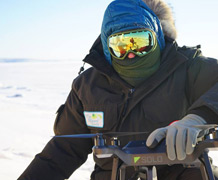Articles

Dr Torney will study collective behaviour in animals in their natural environment and how they decide when and where to migrate.
Mathematician awarded £300,000 to study movement of wildebeest, reindeer and salmon
A University of Exeter mathematician has been awarded more than £300,000 ($450,000) to study collective behaviour and decision-making patterns in animals in the wild.
Dr Colin Torney, a lecturer in the College of Engineering, Mathematics and Physical Sciences, is one of two UK-based researchers to have secured a grant from the US-based James S. McDonnell Foundation, which granted £9.6million ($14m) in research funding last year.
The 21st Century Science Initiative’s Award for Studying Complex Systems will fund Dr Torney’s four-year study into collective behaviour in animals in their natural environment and how they decide when and where to migrate. Working with international collaborators and colleagues at the University of Exeter, it will see him collecting data on the wildebeest of the Serengeti, caribou (reindeer) of northern Canada, salmon in the Pacific Northwest, and bar-headed geese on their migration across the Mongolian Steppe.
Dr Torney said: “Animal groups are a classic example of a complex system in which individuals must reconcile personal objectives with their social context. Long-range animal movement is often a multi-level process in which individuals aggregate, collective behaviour emerges, and conformity abounds. The purpose of this research is to explore these themes in a range of migrating animals”.
By employing state-of-the-art robotics and computer vision software, the trajectories of animals will be recorded as they make their journeys. Analytical tools will be used to assess the role of sociality in movement decisions and investigate leadership roles, the effect of environmental cues, and the consequences of travelling in a group. In this way a taxonomy of collective movement will be created.
This will be used to investigate the feedback between the collective and the individual, with the aim of understanding the role of social influence, and its impacts on the stability and robustness of these migrations.
Dr Torney’s project started last September when he visited Victoria Island in the Canadian Arctic, with graduate student Leon DeBell, and they used drones to film the movement of caribou herds as they crossed the sea ice on their way to wintering grounds. The goal was to understand how these herds decide when and where to migrate. The project will assist efforts to protect this migration from the impacts of climate change and commercial development in the region.
Date: 9 February 2016
